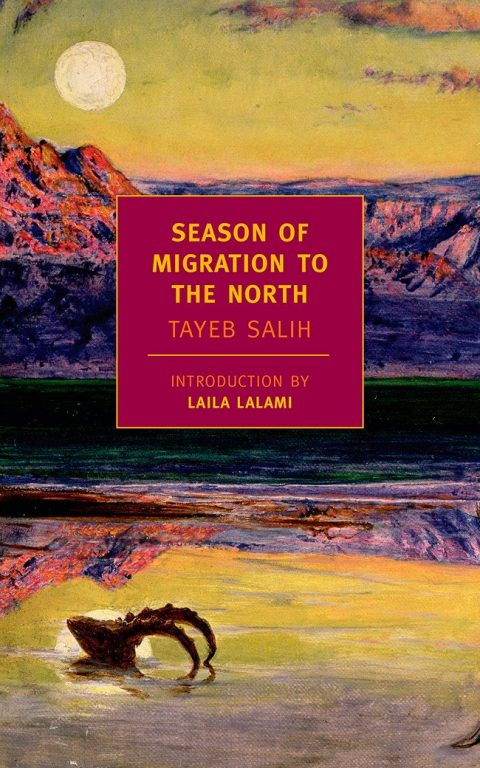I first read Tayeb Salih’s Season of Migration to the North in Denys Johnson-Davis’s English translation as an anthropology student at university. At that time, reading fiction alongside academic texts to illustrate and complement them, I often had the feeling that novels were written with a ruler in hand, drawing a matrix of interrelated themes until their structure was complete, like one anthropology professor in the department who marked his fieldwork transcripts with different-coloured pencils, breaking down hours of meandering conversation to a set of relevant topics. Salih’s novel, I learned, was a classic of post-colonial literature, about the dissonance between East and West, cultural displacement and the shortcomings of modernization.
An unnamed narrator returns to his village on the Nile in Sudan after completing his studies in England. In his absence, a stranger named Mustafa Sa’eed has settled in the village and married a local woman. The narrator asks around about the newcomer, feeling suspicious, but learns only that he is a good man and that he mostly keeps to himself. He pays Sa’eed a visit and is welcomed cordially, but without any of the admiration and curiosity shown by the other villagers.
One night at a gathering, after having had a few glasses to drink, Mustafa Sa’eed begins to recite poetry in flawless English. (The poem is Ford Maddox Ford’s ‘Antwerp’ and I’m indebted to Sa’eed’s drunken outpour for the discovery: ‘An October like November / August a hundred thousand hours / And all September / A hundred thousand, dragging sunlit days’.)
The following day, the narrator questions Sa’eed and finally learns his story after being sworn to secrecy: like the narrator, Sa’eed was once a student in England, and later became a lecturer in economics. He was always praised for his brilliant mind and had a series of brutal love affairs with English women, whom he seduced by exoticising himself, telling them about ‘deserts of golden sands and jungles where non-existent animals call out to each other’. His last affair ended with the murder of a woman, for which he served time in jail.
Shortly after this episode, the narrator leaves for Khartoum. The novel progresses in this way – at once aloof and intensely concentrated. Though it is the story of Mustafa Sa’eed, it is told at the mercy of the reticent narrator, in leisurely stretches and with tightly controlled glimpses into Sa’eed’s past that always leave him in the dark. Some months later, the narrator hears that Sa’eed has drowned in the Nile; he is named executor of Sa’eed’s estate and guardian of his wife and sons.
Season of Migration to the North is certainly a very famous book, especially in the Arab world and among scholars. It is taught widely in cultural studies classes, often alongside critical works like Edward Said’s Orientalism. Said himself named it one of the six best novels in Arabic. In 2001 it was named the most important Arabic work of the twentieth century. But its literary fame – not just as a culturally relevant book but simply as good literature – is surprisingly modest. While all novels are inevitably political, cultural and historical, it is only the fate of some to be evaluated exclusively in these terms; as examples of a World literature – signifiers rather than the signified.
When I graduated from university and started writing fiction, Season of Migration was among the handful of books I looked to for inspiration. I remembered little of its ‘important’ topics, though I knew its first lines by heart:
It was, gentlemen, after a long absence — seven years to be exact, during which time I was studying in Europe – that I returned to my people. I learnt much and much passed me by – but that’s another story.
I loved those first, mysterious words – ‘It was, gentlemen’ – which gave me a jolt of anticipation; the swiftness with which entire episodes were left to the reader’s imagination: ‘I learnt much and much passed me by.’ I loved, too, the book’s exquisite title, like a line of poetry.
As much as I recalled the novel through its minutely suggestive parts, I might also have felt that these were frivolous asides, almost coincidental, and separate from the book’s real content. (For me, the most memorable section in The Brothers Karamazov is the description of the feast at the monastery, with ‘three kinds of well-baked bread’.)
Of course, literature cannot be separated from its flesh of language and form. Nor can its tangible subject explain why it moves its reader, through the subtleties of language, or the shadowy geographies that it leaves to the imagination. Season of Migration is remarkable for all that it holds back, just like the unseen ‘gentlemen’ to which the story is addressed, or the drunken Mustafa Sa’eed who reveals his hidden past in the form of poetry in a foreign language. Later, Sa’eed tells the narrator, ‘mysterious things in my soul and in my blood impel me towards faraway parts’.
This is one of the best detective stories I know, set in the eerily atmospheric bend of the Nile, among the rustle of date palms and mud houses. It simultaneously unfolds and blurs characters’ identities, as thrillingly as Dr Jekyll and Mr Hyde, as the unnamed narrator slowly assumes the narrative, and the fate, of Mustafa Sa’eed.
The full story of Sa’eed’s past is revealed inside his private room full of books, journals, rugs, and an oil portrait of Sa’eed’s last English lover. Unlocking the room after Sa’eed’s death, the narrator strikes a match and sees the face of Mustafa Sa’eed, before realizing that he is staring at his own reflection.
It is not a book to learn from but one to enter with horror and delight.
Photograph © Motaz Altahir








